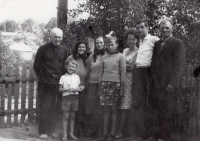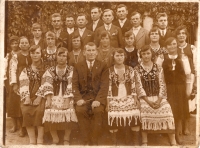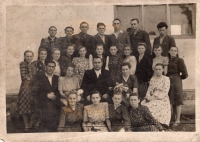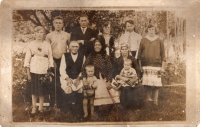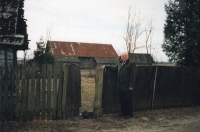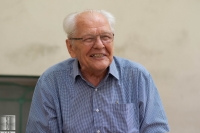There were times when we lived in very friendly relations with Poles, with a Polish family, their surname was Halva. There was my father's peer Stanislav, the mayor, and his father Bronislav. And they were called "Bronki" in the village, everyone in the village then had a nickname. Stanislav had a close friend Karoltsia, Karolina, she was a year younger than me, she was from 1935. I went to their house, they never locked the doors, you didn't have to knock on the doors, you could just walk in and say "Glory to Jesus Christ". The spoken language we had was Ukrainian in its basis. They went to church and prayed in Latin and preached in Polish. But the rural street language in the eastern Yaroslavl region and among the Poles, the Poles were in the minority, it was our language, with certain Nadsyannia elements of the speech like adding "ye" sounds, and "yu" sounds. For instance: "myeso" (meat), etc. If you go to Mostysk, if you meet an old woman there, you will hear my Lyashkiv language. "Khot hev" - come here, I can recall so many things from childhood, everything that happened. And so (50:04 inaudible), which I also knew by heart, I knew carols, because I earned some money when caroled at their house, and they earned some money for caroling at our house. She already (50:13 inaudible name) passed away a long time ago, I didn't find her, she got married later. I also had a friend from a mixed family, my friend, and he also passed away, Tadzio Huk. And so we lived with all those neighbors, we lived together in a rural friendly way.
There were times when the Polish people's government disappeared, the Ukrainian Insurgent Army unit burned down all state buildings, village authorities, etc., the police fled to Yaroslav, across Sian, and there was anarchy. At that time the UPA (Ukrainian Insurgent Army) was in the power, and Stakh, Halva Stanislav, my dad's neighbor, spent the night at my dad's place, in hiding. If we needed, and my dad often had to spend the night somewhere at his friend's house, I don't know where he was hiding, in what hole, somewhere in his barn, or somewhere else. We ran away when there was threat to our lives. Our village stretched from west to east for a couple of kilometers, and on the farther, there were fewer Poles. There was part of the village - eastern Yaremkiya, then there was part of the village Volia Liashkivska, where Poles never went, it was under Ukrainian rule. So we went with my mother and sister to spend the night there, for the night, because we lived in the center of the village where the school, the government, the wooden church, the catholic church were located. And there was a separate part of the village in the west, called Bavoly because the Poles who lived in Lyashky were mostly concentrated there, it was a Polish corner of the village, and there lived Grela, Grenda, Bavol, Halva, all surnames. Once upon a time, they settled there and so the last names spread across the village - Bavol, Grelia, Grenda, Halva. So... And the shop, as they said "sklep" was in that part of the village. One of the skleps, was located there, it was dangerous for me to go there, in the times of the People's Poland. There were villagers with a slingshot, you know: the rubber band and a stone. And I walked down the street, they knew their people, I talked some Polish with them, I knew it a little bit, and then, there was a period of time for me as a child. It left unpleasant memories, I told my parents about it at home, I was told "you would not go there anymore, kid." Those villagers, they put me with my back forward, and they practiced who hits me better, in the head or somewhere else, you know, with stones from that slingshot. Because I'm Ukrainian, a Ukrainian guy.

